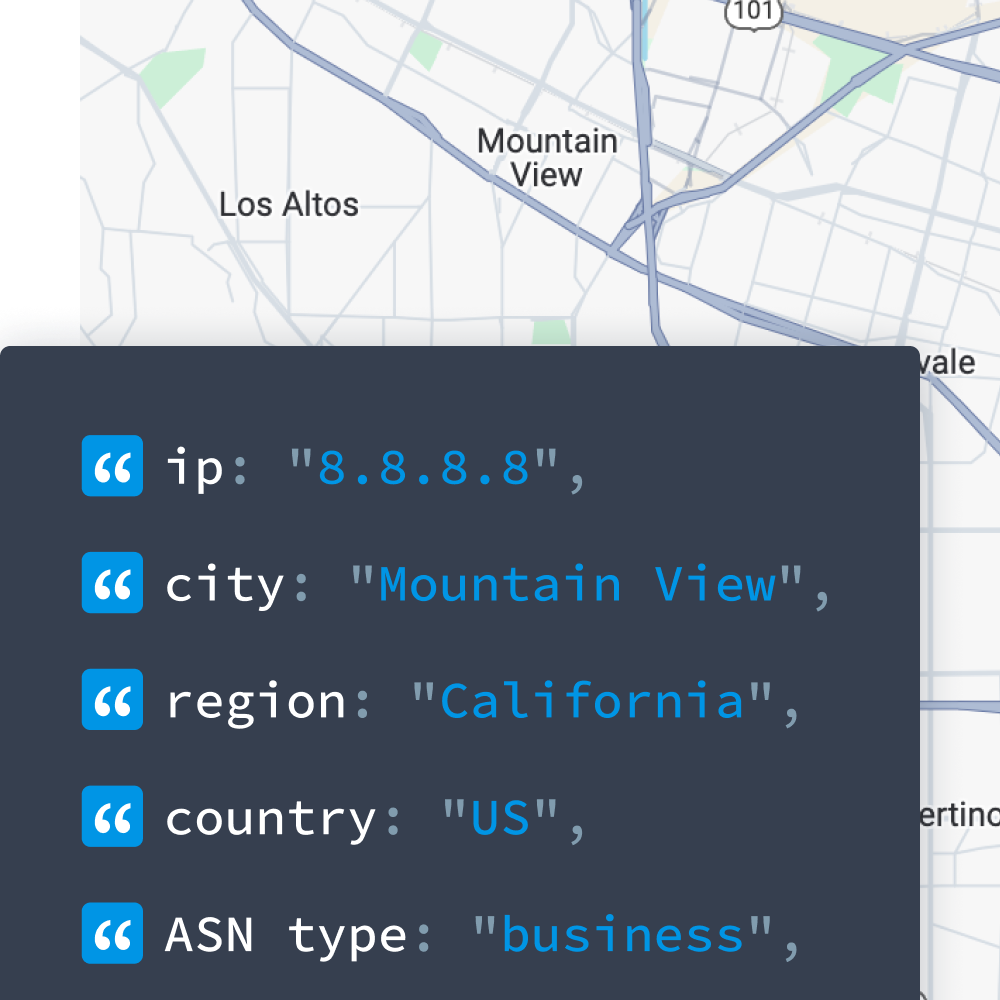 My IP ↗or
My IP ↗orHow accurate is IPinfo's IP address location: verifying IP data accuracy
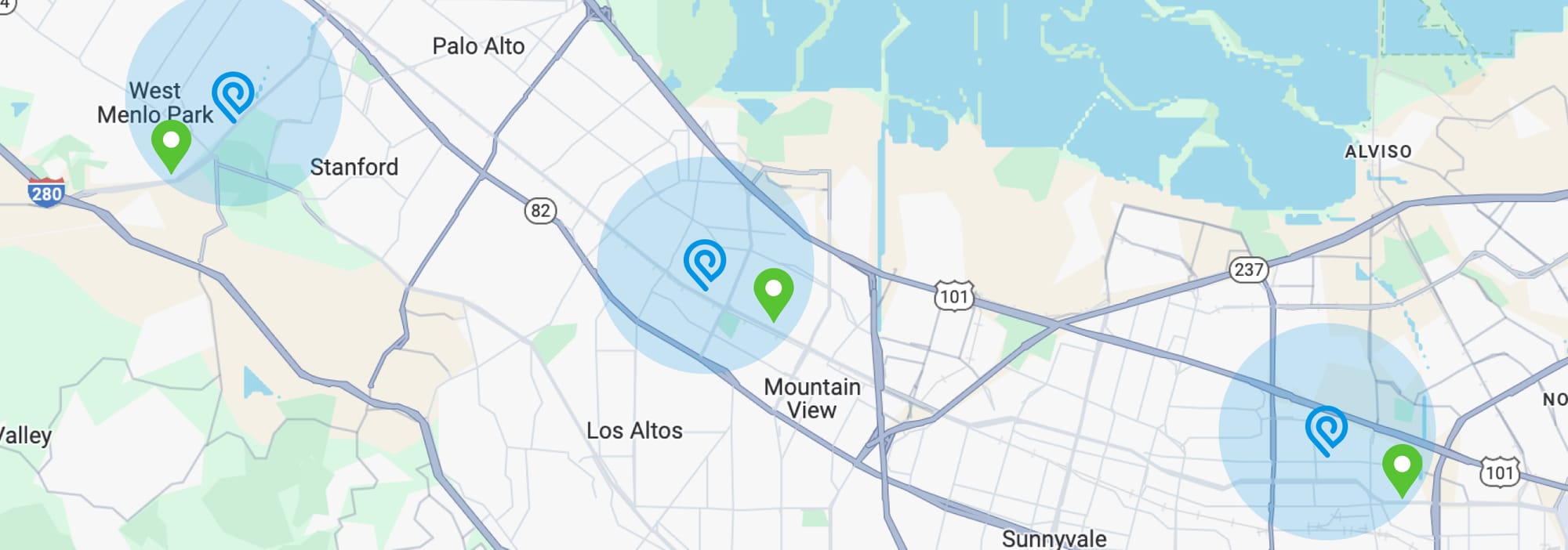
The geolocation process of IPinfo is largely based on our evidence-based process of probing IP addresses. The probe-based IP geolocation process results in highly accurate IP address location data that can also be verified by users. We run our IP geolocation processes daily, ensuring fresh and accurate data. Additionally, we have one of the most sophisticated probe infrastructures in the world, spanning 103 countries across 6 continents.
Now, let’s talk about the evidence of this accuracy claim. We aim for precision of the highest order with our IP geolocation data. Accuracy doesn’t mean that we have to agree with other providers’ data. In some instances, where we pinpoint an IP address’s location doesn’t match the country or even the continent where other providers may think it is. Even if no other provider agrees with our location data, we can transparently show evidence for our decision.
Get accurate geolocation data
Enhance user experience and strengthen your security with rich geolocation data.
What happens when the IP location data is not accurate?
A few examples illustrate how important it is to get this right, as inaccurate IP geolocation data can have practical consequences.
A privacy-focused messaging app's server location mishap

There is a famous messaging service that places heavy emphasis on user and data privacy. In pursuit of this, they have mentioned that they host their data in a neutral country, free from geopolitical issues.
However, one day, amateur cybersecurity researchers brought forth allegations that the messaging platform was not storing the data in a privacy-friendly country as claimed, but instead storing it elsewhere.
This accusation caused a significant buzz on Twitter. The amateur cybersecurity researchers used (incorrect) data from a legacy IP geolocation provider. The messaging platform continuously provided location evidence and later referenced IPinfo’s data to prove that their servers were located in the place they had mentioned.
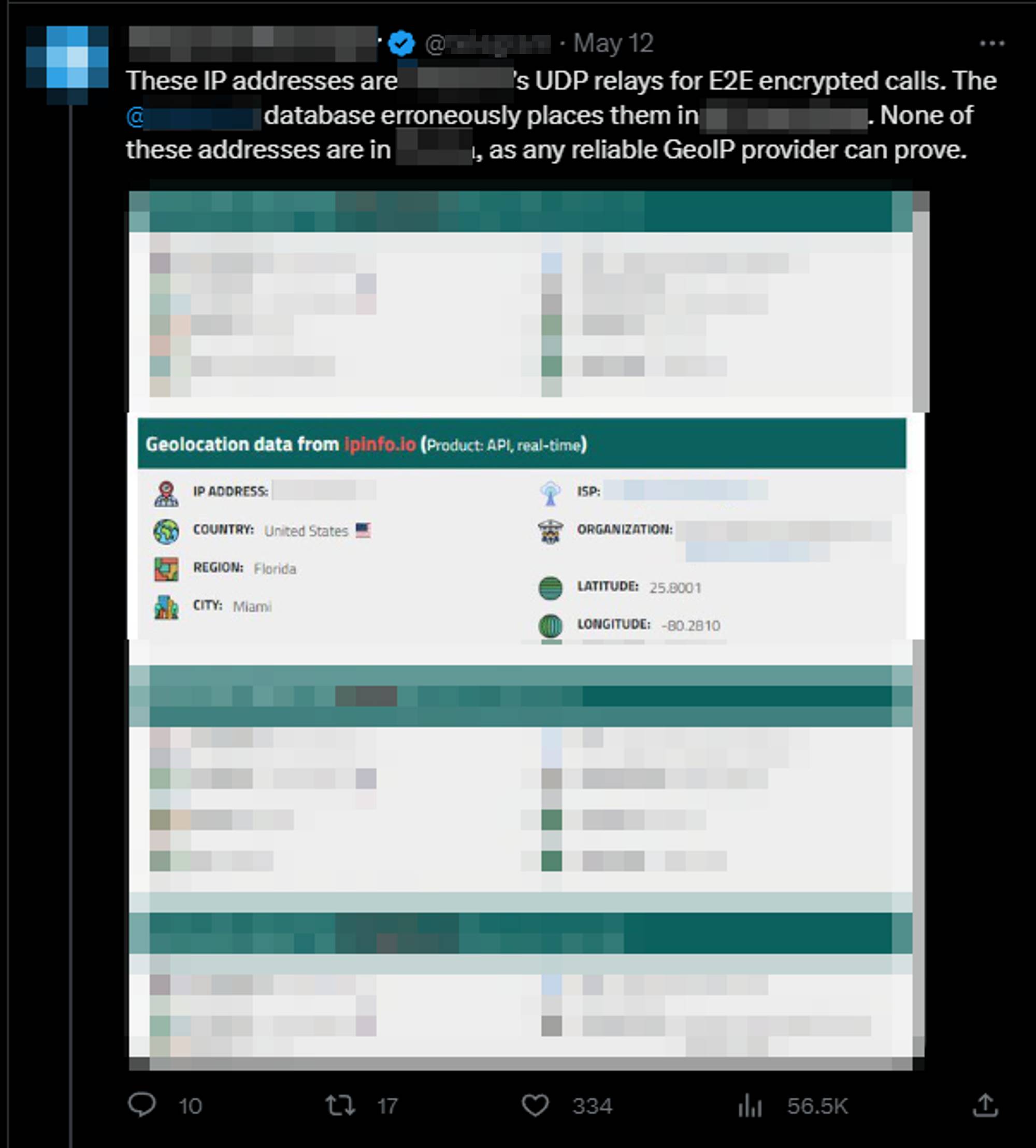
They contacted the legacy provider to fix their location data, but their support did not respond for several days. Eventually, the legacy provider corrected their data, which aligned with IPinfo’s results. The legacy provider never acknowledged their mistake, and the messaging platform's reputation suffered as a result of this saga.
Sports streaming service causes people nothing but frustration
Because of digital asset rights and acquisition policies, TV networks can only broadcast a sporting event within agreed-upon locations. This broadcast practice especially applies to sports streaming services. A very well-known sports streaming service has the rights to broadcast a major sporting event across the United States. However, due to their broadcast contract, they are required to restrict the streaming of specific sporting events to specific regions or states.
This has resulted in the practice called "blackout", which means that if you are not within a streaming target area, the streaming service will not show you the event. However, this provider uses an IP geolocation provider that doesn't provide accurate data.

As a result, customers in a valid viewing location who should be able to watch the event are subjected to blackout. If the subscriber is assigned a dynamic IP address, they may be able to watch an event on one day, but the next day they may be blacked out because the IP geolocation provider does not run daily IP geolocation processes, and they might assign a new IP to the user in a different location.


Therefore, subscribers cannot access content to which they are entitled. They are at the mercy of unreliable IP data. If the service’s support cannot resolve their issue, they may attempt to use a VPN service to circumvent the location restrictions, use an unauthorized pirate streaming service, or simply cancel their subscription.

Probe-based IP Geolocation
Even though we use various public data sources, our entire IP geolocation process relies upon our probe network data. The probe network is our ultimate source of truth for IP geolocation. Learn about our probe network and how we ensure data accuracy from this article.
We also utilize other sources for IP location hints, such as:
These are crucial to the big picture, but they only act as complementary data points. We verify all of this data based on our probe telemetry, and there are good reasons for that.
- WHOIS data can be wrong because organizations sometimes don’t regularly update WHOIS records. WHOIS data generally provides organizational context, is a snapshot-in-time record, and does not provide granular geolocation information of individual IP addresses
- Geofeed data can be wrong because geofeed data is usually too broad and sometimes not specific or precise enough for us
- Correction submissions can be wrong because we believe in “trust but verify”. We appreciate users and organizations submitting corrections very much and are proactive about keeping IP address location data as accurate as possible, however, we verify all correction submissions by probing the IP addresses from our probe network.
We use our probe network for IP geolocation data. The IP probing process involves pinging an IP address from multiple probe servers and identifying the approximate location of that internet-connected device through a process called multilateration. Currently, we have more than 600 probe servers around the world, making this probe network infrastructure one of the largest in the world. By continuously expanding our probe network infrastructure, we ensure highly accurate IP address location data and progressively provide more granular geolocation information.
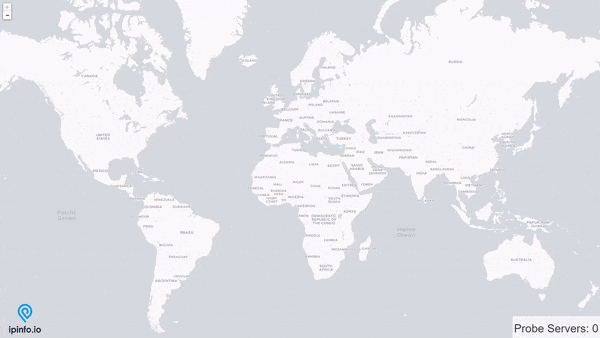
IP geolocation inaccuracies from other providers
We do not use any IP geolocation provider’s data in our product. We perform IP geolocation independently using our own infrastructure and systems. That is why our data can be different from other provider’s data.
Some legacy providers do not typically invest in IP address location data accuracy to the same extent as we do. IP addresses are constantly being reassigned from one location to another. As a result, their data can become outdated and inaccurate. Additionally, dynamic IP address assignments, carrier IPs, and the global trade of IPv4 also contribute to the complexity.
In some instances, other providers can put too much emphasis on the geofeed and WHOIS databases. However, these data sets are often not accurate and could inject noise into the IP location data. This is usually the main reason why our more accurate data doesn't agree with other providers' data.
How to verify IP geolocation accuracy
Do not refer to another provider as a reference
Considering another IP database as the reference benchmark is a common mistake customers make when evaluating our data accuracy.
The reference data from the other provider will likely be inaccurate. When comparing inaccurate data from the other provider with our accurate data, you will likely be false-flagging the accurate IP location data we provide.
Moreover, we have even seen users referring to free IP databases available online to verify our premium IP geolocation data, which is a foundationally wrong verification process. These data reference errors are sometimes even amplified when users use an older IP geolocation database as a reference.
Use independent and verifiable sources of location data such as GPS data, known device location data, or ground truth data. Verifiable reference data is also available to benchmark our data with other providers' IP location data. Also, IP addresses change location all the time, so using an older database will likely cause inaccurate results. It is, therefore, important when testing accuracy to ensure that the latest data sets are being used.
Example
IP address: 13.35.172.198
Provider #1 claims the IP address is located in Toledo, Ohio, US. While IPinfo says, the IP address is located in Al Fujairah City, UAE. Should you use provider #1’s data as reference data to verify IPinfo’s IP location data? Absolutely not.
Using another provider’s data as the benchmark to evaluate IPinfo’s data is not a scientific process, as you can not verify the accuracy of the reference data in the first place. Now, if you use bad data as a benchmark to evaluate good target data, you can conclude that good target data is inaccurate. We recommend you use only verifiable IP locations backed by GPS or familiarity or ping-based insights to evaluate our location data.

WHOIS data is not a valid reference for IP location information
WHOIS data is voluntary data that organizations and ASN report. There is no verification process for the accuracy of WHOIS data. WHOIS records only contain information that the submitting organization wants to share, and there is no review process. Moreover, WHOIS databases are not regularly or automatically updated. In most cases, WHOIS data does not provide actionable and accurate IP address location information. In some instances, we have observed that VPN companies and IPv4 resellers intentionally add inaccurate information. This behavior is mainly motivated by two reasons:
- VPN providers can say they have IP addresses in more exotic places.
- IPv4 IP address sellers can claim the IP addresses they are trading are located in favorable locations in terms of IP reputation.
Our probe-based IP geolocation cuts through any obfuscation, intentional or not, and uncovers the true location of IP addresses in a scientific and verifiable way.
Example
IP address: 104.46.237.59
IP address owner: Microsoft Corporation
The WHOIS data mentions the country as the United States of America, and the city is Redmond, WA. This information pertains to the organization’s (Microsoft) HQ location. This location information has no connection to the location of the IP address. WHOIS data provides organization context only and does not provide much information on the geolocation of an IP address.

IP data pages provide context on problematic IP locations

We confirm our IP location information by using various methods. Over the years, we have identified various reasons why other providers may locate an IP address in a different place than where it truly belongs. Based on this experience, we add context to these location discrepancies in our website IP data pages.
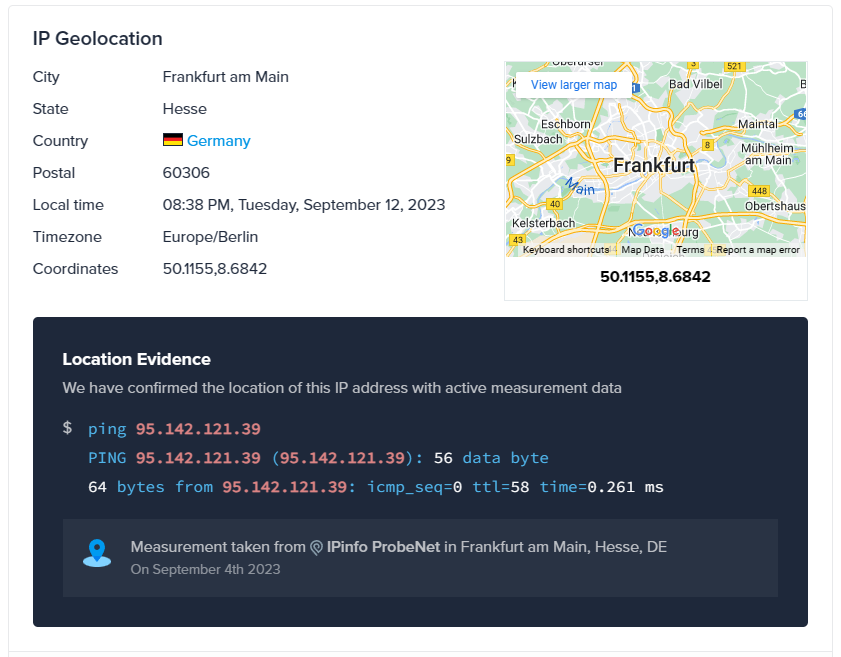
On the website, we will mention which IPs can be considered problematic IP locations. Then, we further provide evidence of why our data is accurate by showcasing the ping information from our internal database.
Ping the IP address and assess the ping time
You can also get an idea of the IP address locations by using services that can ping an IP address from multiple servers across the world. Round-trip time (RTT) is the time it takes to get a response after you initiate a network request. Based on RTT data, you can have some context around the location of an IP address. (This method will work only for pingable IP addresses.)
Example
IP address: 154.31.189.103
On September 13, 2023 (Wednesday), we have the following location information:
- IPinfo.io → Hong Kong
- Provider #1 → United States of America
- Provider #2 → United States of America
- Provider #3 → Germany
- Provider #4 → Germany
IPinfo stands out as the other four providers are split between Germany and the United States of America. But let’s look at the ping data from ping.sx. The ping service pings an IP address from multiple different servers across the world.
From pinging the IP address from those servers, we can sort the results by average scores in ascending order (low to high) to find the lowest ping time. The lowest ping time is from the servers in Hong Kong. It is easy to artificially slow down connections, but fast connections are harder to produce over long distances, so this is a reliable indicator of physical proximity. IPinfo correctly recognizes this information and, based on the ping information, accurately identifies the location of the IP address. The other providers erroneously placed the IP address 8,989 km - 11,642 km away.


Ask for data evidence and check our extended geolocation database
Our data team is happy to share our evidence behind our stated locations of IP addresses. We use a variety of internal tools to verify IP address location. We also share an IP to geolocation location extended database that provides confidence radius information data to help make educated decisions.
Ask in our community
Whenever there are doubts about the location of an IP address, we always encourage users to reach out to us in our community forum where we answer questions, host discussions, and post a wealth of guides and articles. If you know any IP address location is not accurate, consider submitting a correction with us.
In this article, we have outlined the importance of accuracy and how to test for it, and proven the precision of IPinfo's IP geolocation data. Behind every IP address data point from IPinfo, there's a robust infrastructure, an expert data team, and a commitment to continuous improvement. We're here to provide the highest quality IP information for your needs. Whether you're benefiting from our standard database offerings or exploring our custom data solutions, you can trust IPinfo to deliver accurate and reliable data.
Try our suite of free IP tools, register for a free account to access our API and a fully-accurate set of geolocation data, and once you’re convinced that IPinfo offers the most powerful, reliable, and accurate data in the world, reach out to our data account team to learn how the most innovative companies succeed by partnering with IPinfo.
About the author

Abdullah leads the IPinfo internet data community and he also works on expanding IPinfo’s probe network of servers across the globe.
